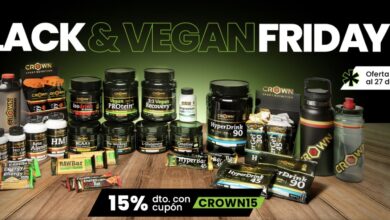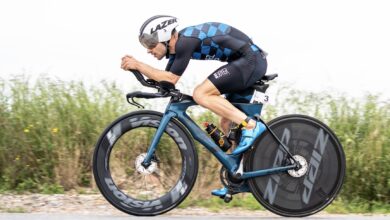How to avoid acidosis to improve sports performance?
We look at “buffering” supplements.

Our friends Crown Sport Nutrition They bring us again a very interesting content for athletes looking to improve their performance.
In this case they tell us what mechanisms are what cause acidosis to be generated and what supplements can help to avoid it.
The first thing to know is what is acidosis to then understand what mechanisms generate it and what components can combat it to prevent performance degradation in training or competition.
What is acidosis?
Acidosis is a condition in which there is too much acid in the body's fluids. There are two types, diabetic and lactic, which is a consequence of lactic acid buildup in the organism
In practice high intensity sports, the energy needed by the muscle (the famous ATP) achieves it through processes external to the mitochondria and that do not depend on oxygen, but a series of metabolites are also produced, such as hydrogen ions (H+) that cause the pH to drop slightly and acidosis to occur.
In the world of sport and athletic performance, acidosis has been extensively studied, showing, although not clearly, in some studies carried out in isolated cells or muscles that it does not decrease muscle function.
However, in other publications where analyzed the organism as a "whole", la pH decrease shows that there is a worse muscle function and finally a worse sports performance.
This may be due to a negative interaction in the muscle-brain connection (neuromuscular function)1.
How is the drop in pH controlled?
In high-intensity sports practice, the body has a series of mechanisms to control the drop in pH.
These mechanisms are calledtampon” and neutralize hydrogen ions avoiding acidosis.
Among the best known are the bicarbonate bufferThere are several types of nutritional supplements on the market that claim to maximize the buffer effect and reduce muscle acidosis.
Below we analyze the most popular tampons based on scientific studies to see if they are effective for the athlete.
Bicarbonate of soda
In a study recently published in the journal Sports Medicine, all the evidence (189 articles) has been analyzed2 on the main buffering supplements.
In this review it has been observed that sodium bicarbonate is the one with the most publications, although they also highlight the sodium citrate or sodium lactate o of calcium.
The results show that these supplements yes they benefit sports performance, finding the greatest benefits in efforts of short duration but as long as they last more than 30 seconds.
In efforts of less than 30 seconds, the phosphagen and phosphocreatine pathway is essential, as the accumulation of hydrogen ions associated with glycolytic metabolism is not so limiting.
In tests where numerous intermittent efforts, such as repeated sprints, no improvement in performance is observed between the first and the best sprint if there is supplementation with buffers, however, if an improvement in overall performance is observed by reducing fatigue throughout exercise.
How much should be ingested?
Analyzing these data, it has been concluded that if there is a supplementation with 0,3 mg/kg sodium bicarbonate 60 – 180 minutes before exercise can improve performance.
beta alanine
Another of the most popular buffering supplements is beta alanine.
Beta alanine is an amino acid that used to make carnosine, a dipeptide that is stored in muscle and acts as an intracellular buffer.
It has also been observed that it is more effective at regulating pH than bicarbonate buffer.
One of the main differences between them is in the intake times. Sodium bicarbonate is supplemented before exercise and in most studies with beta alanine its intake has been applied continuously for several weeks.
How much should be ingested?
The International Society of Sports Nutrition recommends consuming around to 4 – 6 grams daily (spread over 2-gram doses) over a 4-week period3.
Studies show that the benefits of beta alanine are promising in efforts greater than seconds and less than 10 minutes, where acidosis can limit performance.
Furthermore, it has shown improve overall performance by 3% in these kinds of efforts.4,5.
Conclusion
Based on the studies carried out, it can be stated that acidosis appears to play a limiting role in performance in efforts of high intensity and short duration or in repeated efforts.
The body has a series of buffer mechanisms that try to keep the pH stable, although there are nutritional supplements that can help maximize this effect.
An example are the sodium bicarbonate (acute intake before exercise) or the beta alanine (multi-week intake protocol).
As with any supplement, ideally try it before in training and introduce it progressively in order to check the tolerance that our body has.
However, in general these supplements have been shown to be effective in improving performance.
Crown Sport Nutrition has several products that can help you
References
-
CairnsSP. Lactic acid and exercise performance: culprit or friend? SportMed. 2006;36(4):279-291. doi:10.2165/00007256-200636040-00001
-
de Oliveira LF, Dolan E, Swinton PA, et al. Extracellular Buffering Supplements to Improve Exercise Capacity and Performance: A Comprehensive Systematic Review and Meta-analysis. Sport Med. 2022;52(3):505-526. doi:10.1007/s40279-021-01575-x
-
Trexler ET, Smith-Ryan AE, Stout JR, et al. International society of sports nutrition position stand: Beta-Alanine. J Int Soc Sports Nutr. 2015;12(1):1-14. doi:10.1186/s12970-015-0090-y
-
Hobson RM, Saunders B, Ball G, Harris RC, Sale C. Effects of β-alanine supplementation on exercise performance: A meta-analysis. Amino Acids. 2012;43(1):25-37. doi:10.1007/s00726-011-1200-z
-
Saunders B, Elliott-Sale K, Artioli GG, et al. β-Alanine supplementation to improve exercise capacity and performance: A systematic review and meta-Analysis. Br J Sports Med. 2017;51(8):658-669. doi:10.1136/bjsports-2016-096396
There are no previous results.




























